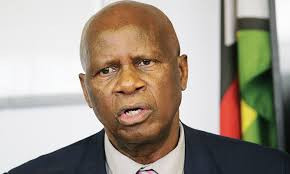
FORMER finance minister Patrick Chinamasa said this week Africa’s economic progress was being held back by disjointed regulations, crumbling infrastructure, and sluggish intra-continental commerce.
With 55 nations operating in isolation, inefficiencies in communication and policymaking are costing the continent vital opportunities, he said while contributing to a plenary session during Afreximbank’s 2025 Annual Meetings in Nigeria.
“Another major challenge is connectivity — between our countries. We often miss out on opportunities because communication from our allies doesn’t reach us effectively,” Chinamasa said.
“We need Afreximbank’s help in building continent-wide infrastructure, which is currently lacking. Additionally, our regulations are fragmented; with 55 countries, harmonisation is essential.
“We must act decisively. Repeating the same decision 55 times across individual nations is unsustainable. Instead, we should establish four regional blocs where decisions, once made, apply to all member states.”
The former minister said African countries should streamline progress, boosting the movement of people and goods within Africa.
“The current issue is that we trade more with external partners than with each other — largely because we export similar raw materials such as copper and chrome,” he noted.
“Only by moving into manufacturing can we reduce Africa’s reliance on external trade and increase intra-African investment and commerce.”
- Open letter to President Mnangagwa
- Feature: ‘It’s worse right now than under Mugabe’: Sikhala pays the price of opposition in solitary cell
- Masvingo turns down fire tender deal
- Human-wildlife conflict drive African wild dogs to extinction
Keep Reading
Chinamasa said infrastructure, particularly railways, was critical for Africa’s economic growth, adding that Afreximbank played a collaborative role in upgrading Zimbabwe’s road networks.
“This, in my view, is the path forward: upgrading our SMEs so they can assume their proper role in the global economy. Remember, we were once completely deindustrialised,” he said.
“Thanks to their [Afreximbank’s] support, we are now self-sufficient — growing our own wheat and maize. This progress was made possible by the backing of Afreximbank.”
Speaking at the same event yesterday, former Reserve Bank of Zimbabwe (RBZ) governor John Mangudya said closing Africa’s US$100 billion trade finance gap required systemic reforms, not piecemeal solutions.
He warned that reliance on external funding models was unsustainable, urging African nations to prioritise domestic resource mobilisation, capital market development, and accelerated financial integration. His remarks come as Fitch downgraded Afreximbank recently, citing rising credit risks, a move critics argue reflects structural biases in global rating agencies.
“Closing the finance gap is not an event; it’s a process,” said Mangudya, who is also chief executive officer of the Mutapa Investment Fund.
“A process that I truly believe institutions like Afreximbank, the Africa Finance Corporation, and the African Development Bank have been actively working to address.
“However, the gap remains enormous, and given its scale, all countries must contribute their efforts to ensure the trade finance gap is filled.”
He said Africa should promote domestic resource mobilisation, as the continent was blessed with abundant natural resources.
“We need to leverage these assets effectively to allocate funds towards closing the trade finance gap. Second, we must encourage domestic savings through bonds and the development of capital markets,” Mangudya said.
“We need innovative funding mechanisms and must create them despite geopolitical challenges.”
The former governor said financial inclusion must be prioritised, noting that financial inclusion rates across Africa remain low, particularly among underserved groups — women, youth, and rural communities.
“We must deepen Africa’s capital markets. Currently, only a handful of countries, perhaps three to five, have strong, viable stock exchanges. We must expand this,” Mangudya said.
“Why? Because robust capital markets attract investment. Regulators and governments must implement incentives — such as tax breaks — to encourage businesses to participate actively in these markets.”
He highlighted the need to boost intra-African trade, citing the pan-African Payment and Settlement System as critical infrastructure for the African Continental Free Trade Area.
“Such platforms enable value exchange through efficient payment systems. Today’s discussion is vital — it centres on enhancing Africa’s financial ecosystem and addressing its challenges,” Mangudya said.
He called for accelerated integration, arguing Africa has too many overlapping financial and economic blocs.
“We need action, not just talk. The vision of an African Economic and Financial Union — where central banks harmonise policies and adopt continental financial instruments — must move from rhetoric to reality,” Mangudya said.
“The time for an African-led solution is now. We must unite under the principle of ‘Africa by Africans, for Africans’ to finalise trade integration.
“Let’s be clear—the global economic headwinds are fierce, and they will only grow harsher for those who delay.”
Running under the theme Building the Future on Decades of Resilience, the annual event brought together an influential coalition of global, African, and Caribbean Community leaders.
It focused on advancing trade, investment, and innovation across the continent.






